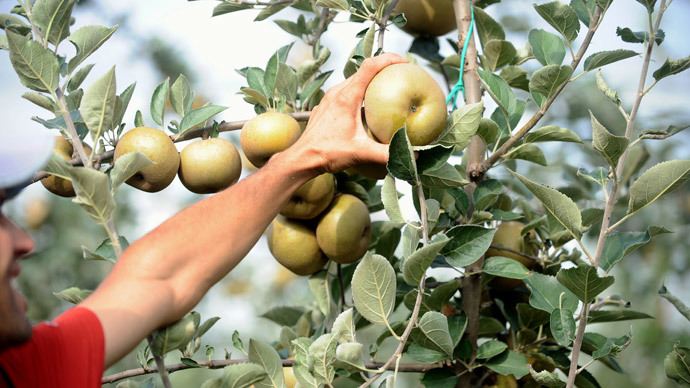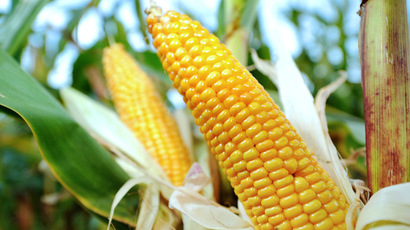Most apples in the US drenched with chemical banned in Europe

A chemical used on most non-organic American apples that preserves the fruit’s color after harvest was banned by the European Union in 2012 because its makers could not prove it did not put human health at risk, according to a new study.
The US Department of Agriculture (USDA) found in 2010 that 80 percent of apples harvested in the United States are coated with diphenylamine, or DPA, a “growth regulator” that works to stave off darkening of the fruit’s skin during months of cold storage.
DPA, regulated as a pesticide, has been used in the US since 1962. The USDA has reported that DPA residue is found more often and at greater concentrations that most other pesticide residues. The chemical has been detected in apple juice and applesauce, as well as pears and pear baby food. In fact, the USDA has consistently found that apples are one of the most pesticide-treated products in the American produce market.
Beginning in 2008, the EU’s European Commission asked European producers of DPA to prove nitrosamines – a family of powerful carcinogens – and other harmful substances would not develop from a mixture of DPA and nitrogen, a common element in the environment. The Commission was interested in whether those formations occurred when containers of DPA sat unattended, when DPA was used to treat fruit for storage, or when DPA-doused fruit was made into juices, purees, and sauces.
Industry in Europe could only point to one study that detected three unknown chemicals on DPA-coated apples, though the study did not determine if any of the chemicals, formed when the DPA broke down, were nitrosamines.
Thus, in 2012, the European Food Safety Authority, which evaluates pesticide risk for the Commission, found that industry could not prove the safety of DPA, banning its use in Europe. In March, the Commission dropped the allowable level of DPA on imported fruit to 0.1 part per million. The average DPA concentration on US apples is about four times higher, at 0.42 parts per million.
“While it is not yet clear that DPA is risky to public health, European Commission officials asked questions that the chemicals’ makers could not answer,”said Sonya Lunder, senior scientist with Environmental Working Group (EWG), which conducted the new analysis of DPA levels in the US.
“The EC officials banned outright any further use of DPA on apples cultivated in the European Union until they are confident it is safe. Europe’s action should cause American policymakers to take a new look at this chemical.”
The US Environmental Protection Agency (EPA) has not responded to the EU DPA ban, nor to the concerns about nitrosamines that came from the European Commission’s investigation. The EPA Pesticide Office, in charge of safety reviews of chemicals used on US foods, told EWG this year that it was unaware of the European ban and import guidelines.
Americans eat about 10 pounds of fresh apples per person each year, the USDA has found. Even low levels of nitrosamines on apple and apple products could pose a risk to human health, the EWG said.
“Americans, particularly parents of young children, deserve the same level of concern from our government,” said Lunder. “Apples, apple juice and applesauce are staples in the diets of millions of children, so if there are potential risks to kids from DPA, we need to know now.”
EWG has urged the EPA to follow Europe’s lead in scrutinizing DPA prevalence in American apple supplies.














